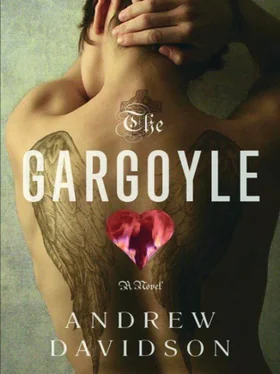Things appeared to be good for everyone, in this century at least: there was Marianne Engel’s returning health; Sayuri talked about the great success of her trip to meet Gregor’s parents; and Gregor confided over coffee that he was more or less certain that Sayuri liked him. Even Bougatsa was pleased, as he was able to go for daily walks with his mistress again.
Often at midnight, Marianne Engel and I would take trips to the ocean. Despite the hour and the biting cold there were usually a few teenagers on the shore, drinking beer and making out. She would light bonfires, tending them as they sent ashes into the sky, and feed me from the picnic baskets that she always prepared, often with leftovers from the previous day’s international buffet. She lit the fires in an effort to lessen my fear of them; she said I needed to come to some sort of understanding with the elemental forces of the universe. They weren’t going away, after all.
I could not look at the fires without emotion, but surprisingly I thought less about my own fate in the car than I did about my fourteenth-century counterpart in the flames, nailed to the wall. I begged Marianne Engel to continue the story but she urged patience, citing more nonsense about single days in the vastness of eternity. Instead, she told me other stories that I knew were not true, creation and Armageddon myths, but I didn’t care. If she believed them, that was enough.
Then she would look out over the ocean, stretch her legs in its direction, and lament the fact that it was not yet warm enough to go swimming. “Oh, well,” she’d say, “I suppose the spring is coming soon enough…”
· · ·
My pressure garments came off in early February and it was like emerging from a slough in which I had been swimming for nearly a year. My mask and dental retractor were also removed and my face was finally returned to me, albeit unrecognizable as the one I had before.
I experienced the panicked exhilaration that comes with starting anew. It’s not easy to look the way I do: in popular culture, one only sees a face like mine on the Phantom of the Opera, on Freddie Krueger from Elm Street, or on Leatherface from deep in the heart of Texas. Sure, a burn victim may “get the girl”-but usually only with a pickax.
I hesitated to claim possession of my face, but this was also why I had to: if I didn’t, it seemed inevitable that my face would take possession of me. The clichй goes that at twenty a person has the face that God gave him, but at forty he has the face he has earned. But if the face and the soul are intertwined so that the face can reflect the soul, surely it follows that the soul can also reflect the face. As Nietzsche wrote: “The criminologists tell us that the typical criminal is ugly: monstrum in fronte, monstrum in animo (a monster in face, and a monster in soul).”
But Nietzsche was wrong. I was born beautiful and lived beautiful for thirty-plus years, and during all that time I never once allowed my soul to know love. My unblemished skin was numb armor used to attract women with its shininess, while repelling any true emotion and protecting the wearer. The most erotic of actions were merely technical: sex was mechanics; conquest a hobby; my body constantly used, but rarely enjoyed. In short, I was born with all the advantages that a monster never had, and I chose to disregard them all.
Now my armor had melted away and been replaced with a raw wound. The line of beauty that I had used to separate myself from people was gone, replaced by a new barrier-ugliness-that kept people away from me, whether I liked it or not. One might expect the result to be the same, but that was not entirely true. While I was now surrounded by far fewer people than before, they were far better people. When my former acquaintances took a quick glance at me in the burn ward before turning around to walk out, they left the door open for Marianne Engel, Nan Edwards, Gregor Hnatiuk, and Sayuri Mizumoto.
What an unexpected reversal of fate: only after my skin was burned away did I finally become able to feel. Only after I was born into physical repulsiveness did I come to glimpse the possibilities of the heart: I accepted this atrocious face and abominable body because they were forcing me to overcome the limitations of who I am, while my previous body allowed me to hide them.
I am not a hero in soul and never will be, but I am better than I was. Or so I tell myself; and for now, that is enough.
· · ·
Marianne Engel entered my room on February 13, midnight, and took me by the hand. She led me down the stairs and out the back door. Snow was falling, making it look as if the stony monsters littering the backyard were wearing white hoods.
She pulled open a gate that allowed us to enter the cemetery behind St. Romanus. Gravestones popped out of the snowdrifts like gray tongues and we tiptoed past them to the center of the cemetery, where she had already laid out a horsehide blanket. Above us, the moon was a magnificent blister in the midst of a gooseflesh of stars. Marianne Engel tried lighting candles but the wind kept blowing her matches out, and she laughed at this. She pulled her coat tighter around her body. I hated the cold but I liked being near her.
“I’ve brought you here to tell you something,” she said.
“What?”
“I’m going to die soon.”
No, you’re not. “Why would you say that?”
“I’ve only got sixteen hearts left.”
“You’re going to live until you’re an old woman,” I assured her. With me.
“I’m already old.” She smiled, wearily. “I hope this time, death takes.”
“Don’t talk like that. You’re not going to die.” You’re not going to die.
She put her hand on my cheek. “My last heart has always been for you, so I need you to prepare.”
I was going to tell her that she was talking nonsense, but she moved her finger over my lips. When I tried to speak anyway, she kissed me on my thin lips and all my words were pushed back into my mouth.
“I don’t want to die,” she whispered, “but I need to lose the shackles of this multitude of hearts.”
“It’s just-you have this medical condition.” I wondered to what degree I felt such tenderness towards her because of her schizophrenia, and to what degree despite it. “I know you don’t want to believe it, but it’s true…”
“How little you believe, and how very much it takes to make you believe,” she said. “But you will. Now let’s go inside.”
The way she stated that we should go inside with such finality, such certainty, made me fear the worst. “Why?”
“Because it’s freezing out here,” she said, and my relief must have been visible. “Don’t worry, I’m not ready to die tonight. We still have things to do.”
“Like what?”
“Like getting you off the drugs.” NOT LIKELY.She said, “Do you really think I don’t know you’ve been buying extra morphine?”
· · ·
That morning, Valentine’s Day, when I woke, I looked into the small wooden box that held my morphine stash to find it empty. I staggered into Marianne Engel’s bedroom, where her body lay unmoving. I shook her by the shoulders and when she opened her eyes a little, I asked where my kit was.
“Get into bed with me. You’ll be okay.”
“You don’t understand. There’s a snake in my spine-”
“Silly boy,” she said. “You should know better than to listen to snakes. They lie.”
“You didn’t give me enough time to adjust to the idea,” I pleaded. “Tomorrow, I’ll quit, but give me a day-”
I AM ALMOST HERE…
“Suffering is good for the soul.”
“No it isn’t!”
Читать дальше











